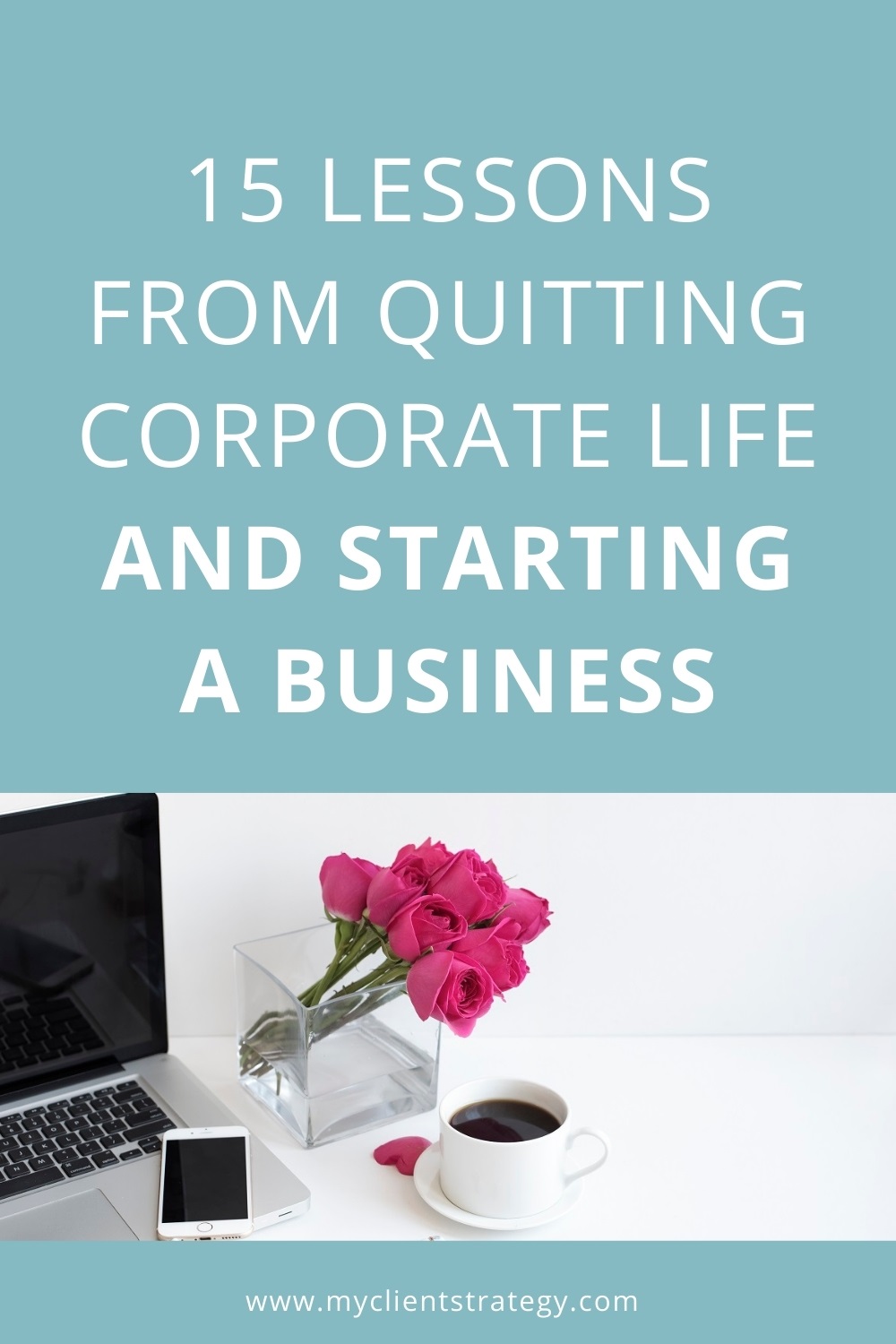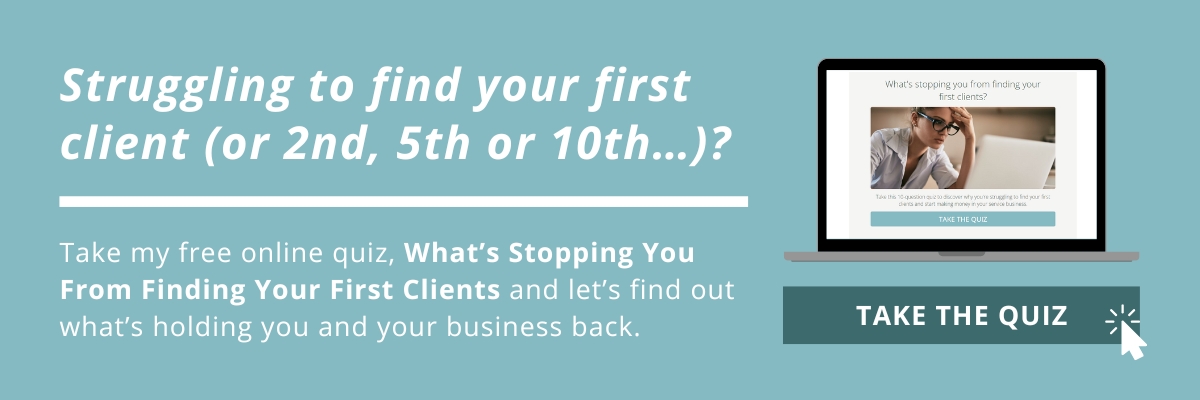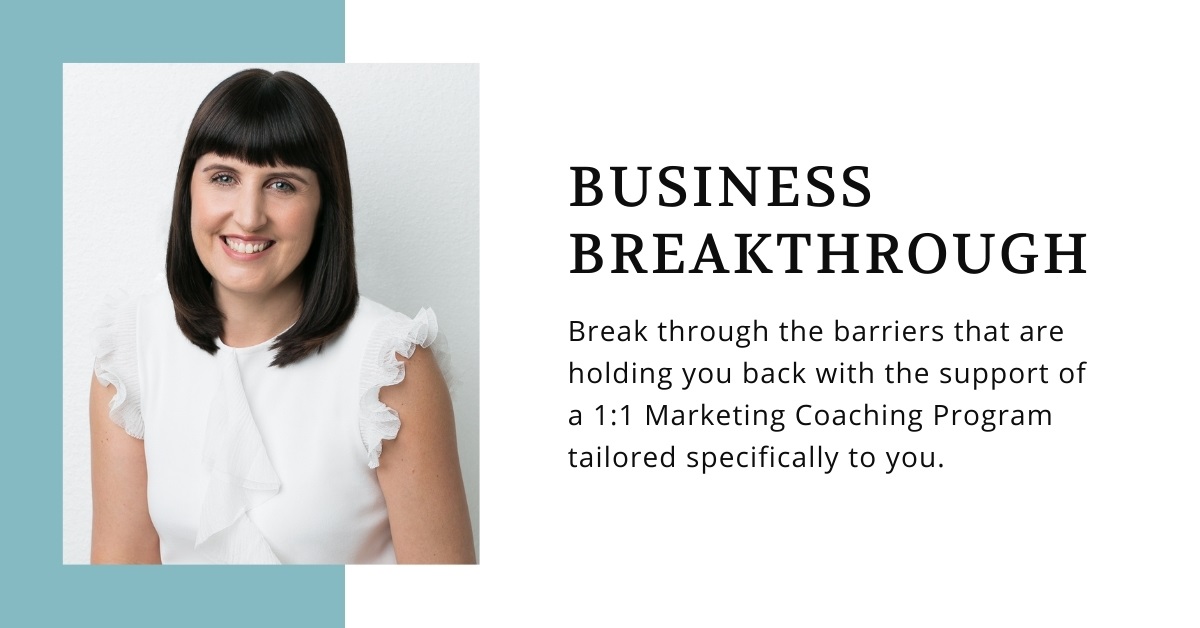15 Lessons from quitting corporate life and starting a business

In 2018, I quit my corporate job and started my online coaching business, My Client Strategy.
And, I wanted to share with you some of the lessons I’ve learned from taking the leap out from my comfortable 6-figure corporate job and starting a business.
Why am I sharing these business lessons now?
I often get asked for advice about starting a new business and what I did to make my goal a reality.
Also, why I decided to go for it and what I would recommend for anyone else considering the same path.

So, to start with, the main reason why I quit my corporate life was that I didn’t feel like I was in the right place anymore.
I wasn’t waking up with the enthusiasm and excitement I should have to go to work each day.
And my corporate job wasn’t giving me the freedom and flexibility I was looking for to spend more time with my family and friends who were living interstate.
Once I’d decided to quit my corporate job, I started to prepare as much as possible for the experience ahead.
I had been thinking about starting a business for a while, so I had a plan of sorts.
But I’ve learnt even more about launching and running a small business along the way.
So, after several years in business, here are some of the main lessons I’ve learned after quitting corporate life and starting a business:
1. Keep your corporate salary for as long as you can
I decided to quit my corporate job at least 12 months before I resigned.
Waiting a bit gave me the time I needed to save enough money to set up my business and have savings that I could fall back in those early days when there wasn’t any money coming in.
Having those savings took away so much pressure to bring in revenue from the beginning.
So, if you can continue to work while you’re going through those early set-up phases (even if it’s just part-time), it will take away the financial pressure and allow you to focus on and enjoy growing your business.
"If you can continue to work while you're going through those early set-up phases (even if it's just part-time), it will take away so much financial pressure and allow you to focus on and enjoy growing your business." – Hayley… Share on X2. Know how much money you’ll need to cover your expenses
When you work in corporate life, you tend to focus on how much you earn.
But I’ve realised it’s a lot more critical to focus on how much your expenses are first.
When I was trying to figure out what I would need to save as a financial buffer, I calculated my current personal expenses and what I would need to cover in that first year of business. This amount became my savings goal.
So, before you quit your corporate income altogether, be sure to crunch the numbers in your expenses budget, so you have them covered.
3. Create multiple income streams
It took longer than I initially thought to start bringing in revenue for my business.
So, it was helpful that I had other investments (an investment property and shares) that I could rely on for extra income.
Before you leap out of corporate life, perhaps consider if there are other ways you could earn income in addition to your business revenue. Or investments that you could make?
Alternatively, do you have assets that you could sell to boost your savings faster?
4. Get support from others who have been where you want to go
I’m a very determined and persistent person, which can be a good thing.
However, these traits held me back when building a business in the early days, as I didn’t reach out for support straight away.
I spent a lot of time trying to figure it all out on my own, which cost me a lot of time and left me feeling very frustrated!
Once I reached out and enrolled in some courses and coaching programs, I could access the support I needed to grow.
I avoided making costly mistakes, and I started working on things correctly, which enabled me to get to where I wanted to be a lot sooner than if I kept going it alone.
Not sure where to start when it comes to finding your first clients? That’s where I can help. Get started today by clicking the button below to take my quiz – What’s Stopping You From Finding Your First Clients – and let’s discover what’s been holding you back:
5. Get comfortable learning new things
Working for yourself is so different to working for a corporate organisation.
You’re required to learn many new things and aspects of business that are well outside your expertise.
So, when starting a business, I recommend accepting that there will be challenges and new things that you need to learn.
And that you won’t get everything right the first around.
However, every experience is just part of the business journey, and you’ll learn a lot along the way!
6. It’s very different working on your own
When I started my small business, I had very few small business owners in my support network.
All my friends worked in corporate life, and I found it quite challenging working on my own after so many years working in large corporate organisations.
One of the best things I did was join a few paid business women’s networking groups.
While the free communities and online Facebook groups can also be helpful, I found the paid membership communities were better for helping me to drive my business forward.
It also gave me the connection and support I needed to keep going even on those tough days, and it has also helped me get my name out there and generate referrals for my business.
7. An outside support network is so valuable
While family and friends provide fantastic support, I’ve found they also worry about you a lot, and there can be negativity and tension if things aren’t going well.
There are many ups and downs in business, so it’s essential to build a network outside of your close family and friends group.
This network will give you a good outside perspective and others to speak with who are in the same position as you to lean on for support.
RELATED: How to build a network. The ultimate small business networking guide
8. Professional support saves you from stress and worry
No one is an expert in everything, and I have needed professional support at various times to ensure my business is set up and running correctly.
I’ve built up a trusted professional network around my business.
I have hired professionals to manage my accounting and tax returns, draft legal contracts, teach me about online business, and write copy for my website, to name just a few examples.
It’s reassuring to know that my business’s legal and financial components have been set up right from the beginning, and it has meant that I’ve avoided a lot of stress and worry.
9. Invest in the right marketing tools at the right time
I’ve spent a lot of time and money testing out various marketing and business tools and systems over the years.
And what I’ve learned is the importance of investing in the right tool for the stage of business that you’re in.
There’s no point in paying for the best system or the plan with the greatest number of features if you do not use them.
It’s much more cost-effective to start with entry-level marketing tools and systems and upgrade as your business grows.
It will also save so much time because the more advanced tools often take a long time to set up and integrate into your business.
RELATED: 30 Marketing tools every service-based business owner should know about
10. Building a business takes time
It’s easy to get caught up in comparing yourself to other business owners and worrying that you aren’t making progress fast enough.
However, from what I’ve seen and experienced, there are very few people who are ‘overnight successes.’
Often, the successful people you see and hear about are on to their third or fourth business idea or have worked on their business as a side hustle for months or years before their first big launch.
Then, others are spending a small fortune on digital advertising and not making much (if any) profit.
I recommend staying away from the comparisons and focusing on growing your own business.

11. Make smart investments along the way
Every time I’ve invested in my business, I’ve seen a positive return. I don’t believe this is good luck; instead, I do my research and have clarity about the investments I think will be smart for my business.
Before I invest in any new marketing tool, coaching program, course, or other business expense, I research a few alternatives to compare.
I follow the person or company I want to invest with and take note of the testimonials and reviews others have provided.
Finally, I also consider how this could help me progress and grow my business, and what skills or networks I could gain.
Sometimes, it’s not just direct investment that benefits you. You can also benefit from being introduced to others or learning new skills that you can use to support your clients.
RELATED: 5 Ways I invested my marketing budget when starting my business
12. Make use of your online sales and marketing channels
When I first started, I very deliberately set my business up to provide online coaching.
Not only could I then work from anywhere (giving me the freedom and flexibility I was looking for).
But I could also run quite a lean business model without the costly overheads of an office or travel.
In addition, I can reach a much greater audience online, which provides a larger target market and more opportunities to grow.
While I provide most of my online coaching services in Australia and New Zealand, I also have clients in the USA, UK, Canada, and Europe.
13. Remember why you started your business
When I focus on why I started my business, it brings me back to two things: firstly, what I want to achieve with my business, and secondly, who I am here to help.
By focusing on these two things, I can quickly eliminate the many distractions that come along when you’re running a business.
I can concentrate more on creating the type of services that I enjoy delivering to help my clients.
It also ensures that my operational and marketing activities align with the ‘big picture’ goals I want to achieve for my business.
14. Implement a goal-setting and planning rhythm
When working for yourself, it’s easy to miss deadlines, procrastinate, and put off things that you should be working on in your business.
So, I find a goal-setting and planning rhythm helps me stay accountable to myself and my goals.
I recommend taking time out every quarter to plan your next 90 days of marketing and business activities, which it what I also do with the My Client Strategy Academy every quarter during my mini-mastermind.
This will give you clarity and direction about what you’re trying to achieve and how you’re going to get there.
RELATED: How to write a marketing plan for a service-based small business
15. Upskill and learn how to master your sales and marketing
Even though I’ve worked in sales and marketing my whole career, it’s one of those things that is continuously changing and evolving in business.
So, I’ve had to keep upskilling along the way as my business has grown.
Sales and marketing are essential skills that all small business owners need to learn because they are how they find clients and grow their service businesses.
"Marketing is an essential skill that I believe all small business owners need to learn because it's how you find clients and grow your service business." – Hayley Robertson #marketing #marketingplan Share on XSales and marketing don’t need to be complicated, and like all skills, they can be learnt and mastered.
Once you know the fundamentals of how marketing your business works, it will also help you ask the right questions and get the correct type of support when it comes time for you to outsource your marketing as your business grows.

So, there you have 15 lessons that I’ve learned from quitting my corporate job and starting an online coaching business.
I hope you’ve found what I’ve shared helpful and that it helps to set you up for success as you prepare to launch and grow your new business.
Tired of trying to figure out what you’re missing when it comes to finding clients and making sales in your service business?
Break through the barriers that are holding you back with the support of an MBA-qualified Marketing Coach and Business Mentor who will tailor a 1:1 program specifically for you.

BUSINESS BREAKTHROUGH is a 3 or 6-month 1:1 Coaching Program for service-based business owners who want to develop the strategy, systems, and structure they need to find clients and make sales, so they can stop feeling stuck and start gaining massive momentum in their business.
Did you find this blog post helpful? Please don’t forget to PIN to Pinterest or share on Facebook.



